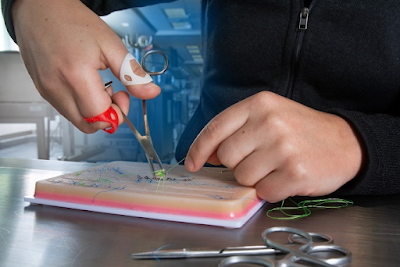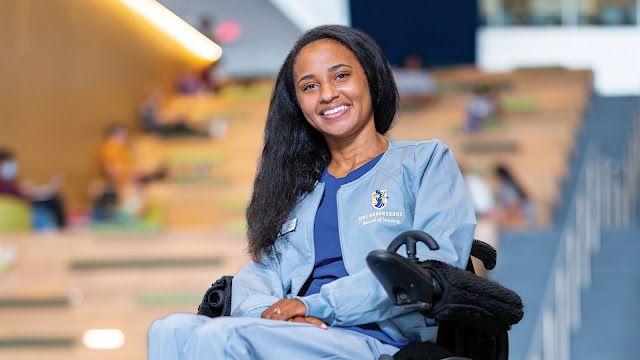David Coates, wrote an article for "Epilepsy Scotland" about Felicity, a nursing student with epilepsy.
How have you managed your epilepsy whilst studying to become
a nurse?
"Rest, medication, and hydration!
Remembering to take my medication regularly has been
crucial. Also, sometimes I do have to give into side effects such as fatigue.
It’s important to rest when your body tells you to. Staying
hydrated also reduces the risk of my medication giving me kidney stones.
It has been important to have a good structure for the
working day since Covid has put all of our modules online.
I find that I work best in the mornings, so I do any new
material then followed by a decent break and then some revision or light reading
in the afternoon.
While on placement in a healthcare setting, I make sure that
the nursing staff is aware that I have epilepsy.
This helps us mold my practice learning environment so that
I minimise my exposure to triggers but still maximise my learning experience.
I have taken part in GP rehabilitation wards, end of life
care, cardiology, and health visiting as well as spending the day with
physiotherapists and speech and language therapy.
Nothing has been off-limits so far. It’s just about working
together and planning ahead."
What kind of support have you received from your university?
The university has been so supportive. It took a while
before I could be persuaded to speak to Disability Services within the
university but they have given me so much support and encouragement.
I receive a little extra time to complete any written exams
and I am able to sit in a smaller room to minimise the stress of the situation.
This also means that if I feel a seizure coming on, I can
make a quick exit to a place of safety.
I have an individual risk assessment for when I am on
practice placement which details things such as I shouldn’t be behind a locked
door and I may need a water break during my shift.
My first placement was meant to be 12.5 hours shifts which
are pretty standard in a hospital environment.
My Advisor of Studies sat down with me and the charge nurse
and we agreed that I could work shorter shifts and gradually build-up to the
full length so that I could adjust to the levels of work.
The University also applied to the Student Awards Agency for Scotland (SAAS) for a Disabled Students Award.
This Grant gives me access to things such as taxis to
placements that are far away or printer ink so that I can print out my lecture
notes and not have too much screen time.
I have to also mention my fabulous friends who keep an extra
eye on me during long, warm lectures.
We make sure that I sit near the end of an aisle and one of
them will come and check on me if I take a long time going to the toilet etc.
I was even a recipient of the Bruce Johnstone Scholarship
during my first year. This is an award given to students who have had to
overcome adversity to gain a place at university.
Do you feel your epilepsy has stopped you doing what you
want to do?
Epilepsy hasn’t stopped me. I won’t allow it to! Sometimes
it’s about finding an alternative route to your goal. Yes, there have been
times when it has thrown a bit of a spanner in the works.
I missed some time on placement after a particularly nasty
seizure, but I worked with the university to find a way for me to stay on
course. Having an open and honest dialogue is so important.
I have always wanted to help people. I did put off applying
to university because I had the misconception that my
epilepsy diagnosis would stop me from working. It turns out that all I needed
was a few minor adjustments.
Living with a chronic condition myself has helped me
empathise with some of the patients that I have met during my training.
A diagnosis can really knock your confidence at first. It’s
good to be able to listen to their worries with a little understanding of what
they are feeling.
What would you say to someone who has epilepsy and is
worried about going to university?
Get in contact with disability services as soon as possible.
They will be able to advise you on every aspect of your student life from how
to stay safe on campus, to any special requirements for both learning
environments and halls of residence.
Get registered with a local GP, they come to freshers week
here. I would advise arranging an appointment to go over how your epilepsy
affects you and your individual care plan.
I would also recommend wearing a medical ID of some sort and
having your emergency contact stored in your phone under “ICE”.
That way if you do happen to have a seizure on campus people
will know that you have epilepsy and who to contact.
Be open and honest with your faculty staff. They cannot help
you if you do not tell them that you are struggling whether that is due to your
epilepsy or other factors.
Make sure that you pace your studying so that you get plenty
of rest and recreation too! Set an alarm for your medication too. It’s so easy
to forget when you have such a hectic study/social life.
Most importantly get stuck in and enjoy yourself! Sign up to
a society to help you make friends, you are a student for such a short time.
Don’t let your condition define you! Go out there and be your amazing self!
Read more about Felicity at:
https://www.epilepsyscotland.org.uk/living-with-epilepsy-and-studying-at-university/
Cheers!
Donna


























